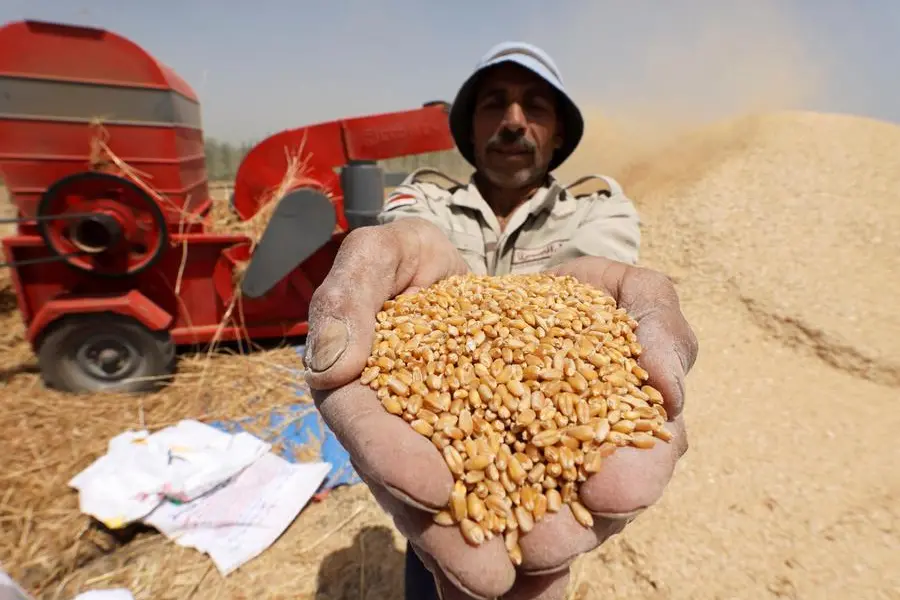PHOTO
CAIRO - Egypt has deferred payments for its large wheat purchases, in some cases by months, according to a government official and traders, as the country grapples with a shortage of hard currency.
Egypt is one of the world's biggest wheat importers and uses the purchases to make heavily subsidised bread, a politically sensitive benefit available to tens of millions of people.
Most deferred payment cargoes have been shipped and unloaded without interruption so far and Egypt's state wheat reserves used to make subsidized bread have not been impacted.
Following the war in Ukraine, Egypt now depends mostly on Russia for its wheat.
Egypt's supply minister told Reuters the country's state grains buyer has deferred opening letters of credit to pay for wheat imports to alleviate financial pressures caused by a foreign currency shortage.
Four grain traders told Reuters on condition of anonymity that delays in payments for state-purchased wheat - considered a top priority commodity - were unprecedented as they were stretching to months.
The traders, who asked not to be named because of the sensitivity of the matter, said issues arose with shipments coming in as early as last December that were to be settled using 180-day letters of credit. Under the letters, a supplier usually receives payment through their bank around shipment time, and the government has 180 days to pay the supplier's bank.
But the traders said that Egyptian state-owned banks, including Banque Misr, acting on behalf of the General Authority for Supply Commodities (GASC), have only opened these letters weeks or months after shipment. One of the traders said that as of last week they were still awaiting payment for a shipment made early this year.
Another trader said Egyptian state banks currently needed to open letters of credit for about eight wheat cargoes, while a third trader said as many as 11 had not been paid for. The delays have not previously been reported. Banque Misr did not respond to a request for comment.
"It was never this late. But the country was never in this situation before. This is brand new for Egypt," said a third trader.
Supply Minister Ali Moselhy acknowledged the delays, blaming it on a shortage of foreign currency that was worsened by the economic fallout from the war in Ukraine and has led to a general slowdown in imports.
"We don't want to add pressure on the central bank. Hence we are phasing with the suppliers and so we have to thank the suppliers very, very, very much for their understanding," Moselhy told Reuters on Thursday.
RISING SUBSIDY BILL
Egypt buys around five million tonnes of wheat annually from abroad. Subsidised bread is available to than 70 million of its 104 million population.
The finance ministry says funding for subsidies on food, mostly bread, will rise 41.9% to 127.7 billion Egyptian pounds ($4.1 billion) in the fiscal year from July 2023 to June 2024.
In recent years most imported wheat has come from the Black Sea and the war in Ukraine initially disrupted purchases. But the government later managed to boost its reserves, mainly relying on Russian wheat imports.
The Ukraine war delivered a broad shock to Egypt's economy, causing investors to pull out billions of dollars. Egypt's currency tumbled and inflation soared.
Many recent wheat purchases have been made with funding from the International Islamic Trade Finance Corporation (ITFC), which last year doubled a credit facility extended to Egypt to $6 billion, and from the World Bank, which in December approved $500 million in development financing, mostly for wheat imports.
Unpaid suppliers have also continued selling wheat at competitive prices despite not receiving payments for older cargoes.
"They do trust GASC 100%. Of course they're not happy but it's not influencing business," said the unpaid wheat supplier.
However, not all traders are willing to take risks, with several highlighting that at the most recent tender for vegetable oils, none of the suppliers submitted offers for payment using 180-day letters of credit, opting for an "at sight" financing option by the ITFC.
"If we have two letters of credit unopened, we don't offer the third one," said the fourth trader, who supplied a vegetable oil cargo for which payment was delayed. "There was a lot of pressure to unload even though there was no LC, and it was a huge amount so I had to go to our CEO and get approval."
Moselhy said last month that Egypt was strongly considering approving the currencies of its commodity trade partners, including China, India and Russia to try to lessen the need for dollars.
Traders have told Reuters that officials have privately blamed the issue on "the state of the country."
"It's not normal but they know it's GASC and it's the government," said the unpaid wheat supplier. "They don't doubt they will be paid."
($1 = 30.8500 Egyptian pounds)
(Reporting by Sarah El Safty Editing by Aidan Lewis, Dmitry Zhdannikov and Susan Fenton)





















